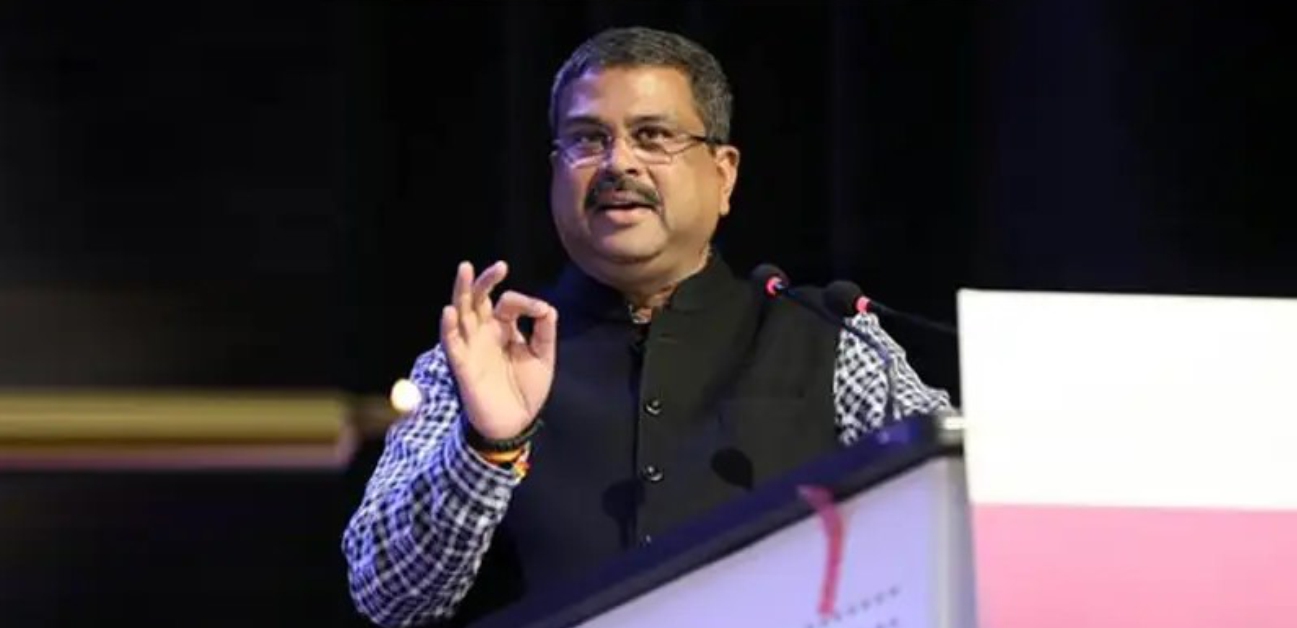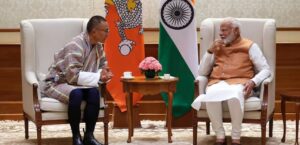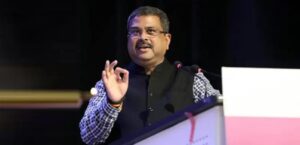Shri Dharmendra Pradhan launches various initiatives in School and Teacher Education
- 2 Minutes read
- Web Admin

Union Education Minister Dharmendra Pradhan. (Photo: PIB)
Shri Dharmendra Pradhan, the Union Minister of Education, has recently unveiled a series of initiatives aimed at the successful execution of the National Education Policy (NEP 2020) at the grassroots level. These endeavors are geared towards fostering greater inclusivity, innovation, and equity in education, with a specific focus on enhancing both school and teacher education. The new initiatives developed by the Department of School Education & Literacy (DoSEL) under the Ministry of Education, aim to empower teachers and students.
Shri Pradhan emphasized that the introduction of DIETS of Excellence, National Professional Standard for Teachers, National Mission for Mentoring, 52 Primers of NCERT, National Vidya Samiksha Kendra, and 200 TV Channels will result in the efficient execution of NEP 2020 at the grassroots level. This initiative aims to empower both educators and learners, fostering a more inclusive, innovative, and equitable landscape for quality education.
During the announcement, he officially unveiled the National Mission for Mentoring (NMM) and National Professional Standards for Teachers (NPST). Additionally, 52 Primers in various Indian languages, printed books on NMM and NPST, along with several schemes/guidelines featuring videos from SCERTs/DIETs, Vidya Samiksha Kendra (VSK), and 200 TV Channels were also launched.
Emphasizing the crucial notion that language embodies power, Shri Pradhan reiterated the transformative impact of learning in one’s mother tongue. He underscored that the introduction of 52 primers in various Indian languages marks the commencement of a profound civilizational renaissance. According to Shri Pradhan, these initiatives are instrumental in shaping a seamless and forward-looking learning environment, fostering education in Indian languages, and actualizing the vision outlined in the National Education Policy (NEP) of 2020. This comprehensive approach, he believes, will holistically revolutionize the landscape of school education.
Sanjay Kumar, the Secretary of the Department of School Education and Literacy (DoSEL), brought attention to the NEP 2020 recommendation to achieve a Gross Enrolment Ratio (GER) of 100% at the secondary level by 2030. He affirmed the Department’s unwavering commitment to realizing this goal. Kumar also shared insights into the development of new textbooks for classes III-XII, with some already in existence and others slated for imminent release. Furthermore, he stressed the significance of the 52 Primers, underscoring their creation in alignment with Shri Pradhan’s suggestions.
52 primers in Indian languages
The issuance of 52 primers or concise textbooks in various Indian languages represents a groundbreaking stride for young learners, particularly in Early Childhood Care and Education (ECCE). This initiative aims to grant them educational access in their native language, fostering an inspirational expedition for budding minds. This endeavor is poised to cultivate a profound comprehension, instigate lifelong learning, nurture a heightened sense of familiarity, and establish a strong connection to indigenous culture. Consequently, it is anticipated to yield greater academic achievements and extend its positive impact beyond the realm of academia.
PMeVidya
The introduction of 200 DTH TV channels as part of the PMeVidya DTH TV channels for school education signifies a crucial element of the PMeVidya Initiative. This initiative is strategically designed to consolidate all endeavors associated with digital/online/on-air education, fostering a comprehensive approach for multi-mode access to education. In alignment to provide resilient and coherent access to education through various channels, the PMeVidya DTH TV Channels are not only accessible on television and radio but are also extended to diverse platforms. This inclusive approach facilitates the seamless creation, development, and distribution of high-quality educational content, ensuring accessibility for free.
National Mission for Mentoring
The NEP 2020 has established the blueprint for a transformative overhaul of the education system, and the National Mission for Mentoring (NMM) is dedicated to offering crucial support and guidance to our committed educators. This initiative aims to foster their professional development, empowering them to construct a robust educational groundwork for our students. Operational through a specialized digital platform, the mission ensures that teachers gain access to high-quality mentoring sessions led by seasoned professionals serving as Mentors. These sessions cater to the diverse needs of learners with varying abilities.
The comprehensive Bluebook detailing the NMM was finalized after meticulous consideration of feedback and suggestions garnered from in-house consultations, 15 open-house discussions, insights from the pilot program, deliberations with other stakeholders, and extensive outreach programs. To facilitate broader dissemination across the nation, the Bluebook on NMM will be translated into the 22 scheduled languages, braille, and audiobooks.
National Professional Standards for Teachers
The National Professional Standards for Teachers (NPST), as outlined in the National Education Policy (NEP) of 2020, is designed to enhance the personal and professional development of educators. This initiative aims to provide teachers with clear expectations regarding their performance and outlines measures to elevate their capabilities. The NPST Guiding Document ensures that students at various stages of school education receive instruction from dedicated, motivated, highly qualified, professionally trained, and well-equipped teachers. Serving as a benchmark for quality, it delineates the competencies expected of teachers at different levels. Successful implementation necessitates collaborative efforts from the Centre, States, Union Territories, Higher Education Institutions (HEIs), Regulating Agencies, Regulatory Bodies, and other pertinent stakeholders. To ensure widespread dissemination, the NPST guiding document will be translated into the 22 scheduled languages, braille, and audiobooks, facilitating broader accessibility across the nation.
National Vidya Samiksha Kendra
NCERT has established the National Vidya Samiksha Kendra to support research and development as well as capacity-building programs. Recently, the National Vidya Samiksha Kendra has been seamlessly integrated with its state counterparts, fostering collaboration and synergy. This integration has significantly enhanced visibility, insights, and actionability across 11 key programs. These programs encompass the National Initiative for School Heads’ and Teachers’ Holistic Advancement (NISHTHA), DIKSHA, Energised Textbooks (ETBs), NIPUN Bharat Initiative for Foundational Literacy and Numeracy, NCERT Quiz, National Achievement Survey, Performance Grading Index (PGI), Unified District Information System for Education Plus, PM Poshan, National Curriculum Framework (NCF), Micro-Improvements program (recognition of best pedagogy practices), PRASHAST (A Disability Screening Checklist for Schools), and PM SHRI. This comprehensive integration serves as a pivotal step towards the holistic development and improvement of the education sector.
DIETs of Excellence
Financial support amounting to Rs 9000 crores will be allocated to States/Union Territories for the comprehensive enhancement of all 613 District Institutes of Education and Training (DIETs), transforming them into DIETs of Excellence across the nation over the next five years. The phased approach will involve upgrading infrastructural facilities with a provision of up to Rs. 15 Crore per DIET under the Centrally Sponsored Scheme of Samagra Shiksha. The Hon’ble Minister further declared that going forward, a similar upgrade will be extended to all State Councils of Educational Research and Training (SCERTs).











